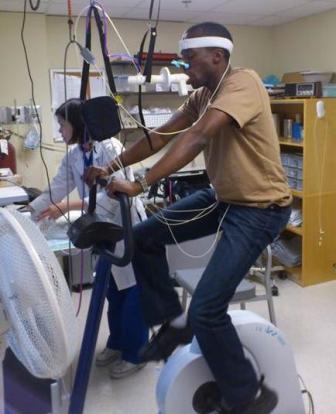17 June 2013
Retired hospital porter Kenneth Paine, 66, was referred to Queen Alexandra Hospital for tests as he couldn’t swallow food. He explained:
“Even though I’ve worked in hospitals for a number of years, knowing that there is something wrong with you is a scary prospect, especially when you are told you need surgery.”
“Being able to do this cardiopulmonary exercise test right on my doorstep was a great reassurance as I was told that the heart and lung tests came back with no issues which means that they are one more thing off my mind as the surgery date approaches.”
Kenneth was one of the first patients to trial a new diagnostic test being performed at Queen Alexandra Hospital called cardiopulmonary exercise testing (CPET). This determines a patient’s fitness to undergo various surgical procedures. During this test, patients simulate the conditions of surgery by being put on a special exercise bike for 20 minutes whilst being observed and closely monitored.
Dr Kayode Adeniji, Consultant in Respiratory & Critical Care is leading the service with the assistance of Dr Matthew Cross, Consultant Anaesthetist. They say: “The availability of the Portsmouth CPET service gives our anaesthetists and surgeons a real option when it comes to preparing patients for their operations. The test mimics the stress the body will be put under during surgery and provides an in depth insight into how their physiology will respond. The test is mainly used pre-surgery to improve the efficiency of care during and after surgery that can potentially decrease any post-op complications which helps improve the recovery time for patients.”
“It allows us to pre-empt some problems that could happen to the patient in during major surgery, so we can plan their care and ensure that we have the necessary medical professionals around to counteract any problems diagnosed through the cardiopulmonary test.”
However this test is not only used to simulate the stress of surgery on the body. It can also be used for other purposes. Adam Spires, a 28 year old audit manager from Southampton was referred to Queen Alexandra Hospital after he began experiencing breathlessness during extreme exercise.
Adam comments: “Last summer I would go running and then start feeling dizzy and blacking out. I knew that something wasn’t right and so my doctor referred me to Queen Alexandra Hospital for further tests. Once at the hospital I was seen by a cardiologist and respiratory doctor, and took the new test in May 2013.”
“I don’t know why I keep feeling breathless but by taking the tests I hope to find out what is happening and get treatment. Running is a huge part of my life which I have had to stop until I find out what is going on with my body. I am still waiting on my results, but work is helping to keep me distracted.”
Before the equipment for this test came to the hospital, patients were referred to the Royal Surrey Hospital, Guildford, whereas now they are seen in the respiratory department at Queen Alexandra Hospital which reduces travel time and improves patient experience for our local population. |


